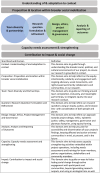How equitable is the conduct of public health research? Findings across case studies from India and Australia
- PMID: 40781668
- PMCID: PMC12333299
- DOI: 10.1186/s12939-025-02593-1
How equitable is the conduct of public health research? Findings across case studies from India and Australia
Abstract
Introduction: There have been many calls globally to intentionally incorporate equity-oriented practices into health research to effectively tackle structural inequalities and prevent the creation of new ones. Several toolkits, guidelines, and training modules have emerged to help research teams integrate equity into research conduct. The adoption of these resources and conversion to practice is varied. Developing a deeper understanding of what these variations are and what drives them may help improve both tools and practice in the global research space. Our aim was to document lessons from diverse ongoing public health research projects on how equity is integrated across research stages, what this entails, and what challenges remain.
Methods: Following an institute-wide appraisal process, we identified five research projects carried out from a networked group of research institutes in India and Australia that offered lessons on addressing equity in the conduct of research. We developed five case studies of these projects using an equity in research heuristic by carrying out 22 in depth interviews and one yarning session (an indigenous knowledge generation and exchange method). We spoke with Principal Investigators, research team members, partner organization members, and community representatives. The interviews covered various aspects, such as the context of the study, team building, study design, and analysis. We asked both about strategies for as well as challenges faced when embedding equity into research processes and phases. We analyzed the transcripts using ATLAS.ti version 23, relying on a deductive coding approach aligned with an existing 8quity heuristic.
Results: Across stages of a research project, efforts were made to integrate equity considerations in all five of our case studies, whether explicitly equity focused (N = 2) or not (N = 3). All studies attempted to locate research in context. For non-equity focussed studies, this was done even when not desired by donors; it was common across project types to have longstanding engagement in particular communities and topic areas. This in turn shaped the formulation of research questions. Equity focused projects invested in inclusion of community members as research team members, while other forms of diversity were prioritised by other teams. All studies placed emphasis on capacity strengthening-for team members (especially those newly joining and not from the community), community members, and health providers. Governance of studies employed strategies like being embedded/living in communities, ensuring engagement (on weekends and evenings), and informal outreach, even as this was sometimes challenging to operationalise. Equity focused projects were concerned with power and coloniality and made explicit efforts to reflect upon and address this. Analysis across studies was concerned with disaggregated analysis; in equity studies, intersectionality approaches were adopted, as was foregrounding indigenous research methods and ensuring respect in attribution of analysis. Marshalling science for better health and greater social justice was a proposition common to all studies, although equity focused studies focused not just on the "what" of their question, but the "how" of conducting research. Impact was an imperative of all case studies, research was seen with a long -term view; the research institution itself having to change to support equity focused and equity in projects.
Conclusion: Case studies of equity integration in research revealed strategies as well as challenges. Many strategies as well as challenges were shared across studies, whether focused on health equity as a topic or not. Overall equity-focused projects had more leeway to focus on process related aspects within study scope, although all studies found ways to change "how" research was done. There is a critical need to frame equity integration not merely as an individual project exercise, but also something that requires institutional backstopping and support.
© 2025. The Author(s).
Conflict of interest statement
Declarations. Ethics approval and consent to participate: Ethical approval for this study was issued by the Institutional Ethics Committee of the George Institute for Global Health (Project Number 02/2023). Written informed consent was obtained from all participants, in addition to which all data collection was performed in accordance with relevant guidelines and regulations in India and Australia. Consent for publication: Not applicable. Competing interests: The authors declare no competing interests.
Figures
References
-
- Health equity [Internet]. [cited 2024 Oct 8]. Available from: https://www.who.int/health-topics/health-equity
-
- Kumar M, Atwoli L, Burgess RA, Gaddour N, Huang KY, Kola L, et al. What should equity in global health research look like? Lancet. 2022;400(10347):145–7. - PubMed
MeSH terms
Grants and funding
LinkOut - more resources
Full Text Sources


